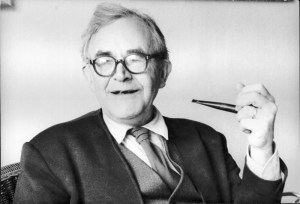Today we’ve got the final installment of Dr. Louis Praamsma’s article from the December 1979 issue of The Outlook (part 1 here, part 2 here, part 3 here). Praamsma was responding to a weakening of the doctrine of Scripture in the CRC especially with men like Allen Verhey and Harry Boer. Within five years, the exodus out of the CRC began. Some of those who were the first ones to leave ended up at the Canadian Reformed Churches. Now these people are watching with deep concern as history seems to be repeating itself. One correspondent mentioned the old saying, “The price of freedom is eternal vigilance.”
Will the Canadian Reformed Churches succumb to the spirit of the age? If the experience of the CRC is indicative, this question will be answered by what parents tolerate in the elementary and high schools, who is allowed to teach at the federational seminary, the questions that are asked of seminary students/graduates at classis exams (and how the answers are evaluated), and where children are sent for post-secondary education.
**********************
Bavinck and Machen
Must I mention more names? Must I speak of Herman Bavinck who absorbed all the wisdom of liberal Leyden of his days and kept his faith, faith in an infallible Bible? Must I mention Gresham Machen who absorbed all the wisdom of liberal Germany in the beginning of our century and wrestled with it until he had conquered it and then became that outstanding champion of truth? Machen wrote, “I hold that the biblical writers, after having been prepared for their task by the providential ordering of their entire lives, received, in addition to all that, a blessed and supernatural guidance and impulsion by the Spirit of God, so that they were preserved from the errors that appear in other books and thus the resulting book, the Bible, is in all its parts the very Word of God, completely true in what it says regarding matters of fact and completely authoritative in its commands” (The Christian Faith in the Modern World, 36-37).
The point is again that not the valiant Machen wrote those words, but that Machen, who wrestled with all the intellectual problems which then and now are brought in against inerrancy and had conquered them, wrote those words.
Must we draw the conclusion now that Augustine and Calvin, that Kuyper, Bavinck and Machen, not to mention many more, belonged to a certain kind of Reformed tradition which should be described in Dr. Boer’s words as “an unprincipled ruthless exercise that bends any desired Scripture in its foreordained meaning”?
Mind well what Dr. Boer means: he wants to tell us that those men made use of their own logical foreordination, not of that of God.
Escape from Unbelieving Rationalism
We should not draw that conclusion. We should say that those theologians had escaped from that rationalism which wants to mould and model Scripture after a pattern of time-bound human logic. Their eyes had been opened to the limits, the defects, often the arrogance of that human logic. They knew that even the best-informed human scholar does not know everything.
Those “best-informed scholarly theologians” are now referred to as form-critics. They always speak about documents which they can never produce. They always refer to a tradition-behind-a-tradition which they construct with all the ingenuity of first-class detectives. They are the professionals who know – know what? Next year they will tell you which hypotheses are more probable than those of last year.


